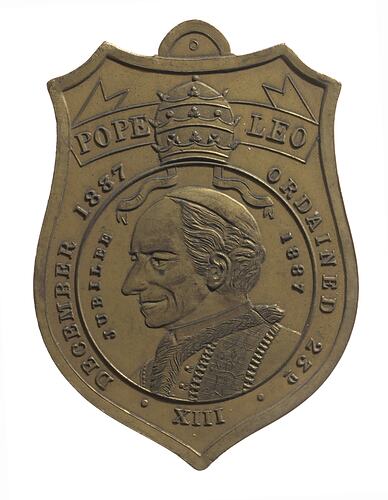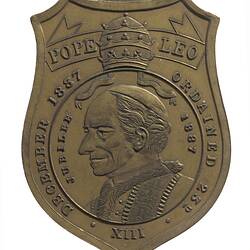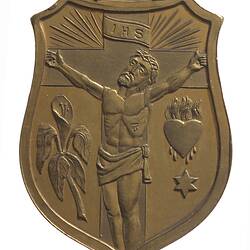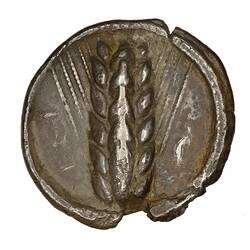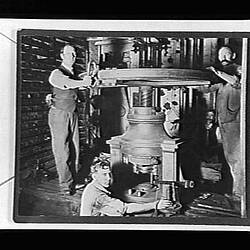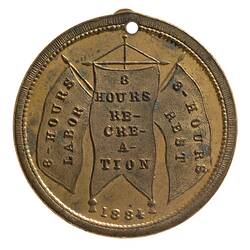Summary
Australia Victoria
Jubilee of Pope Leo XIII, 1837 - 1887 (AD)
Mint: Stokes & Martin
Other Details: Medal issued in 1887 in commemoration of the jubliee of the ordiantion of Pope Leo XIII. Pope Leo XIII changed the course of the papacy. He was a modern man, and he worked to bring Catholic attitudes into the modern era. His 1885 encyclical Immortale Dei explained the position of Catholics as citizens in modern secular, democratic states. Pope Leo XIII was also politically-minded. He tried to bring French Catholics to support the republic. He opposed the anti-Catholic government of Italy, and in 1887 managed to end the political struggle for the rights and self-government of the Catholic Church, carried out chiefly in Prussia and afterwards in Baden, Hesse, and Bavaria (Kulturkampf). In 1891 he explained the defficiencies of Marxism in Rerum novarum. He countered intellectual attacks on Christianity by advancing Thomism, with its insistence that there is conflict between science and faith, and founded the institute of Thomistic philosophy at the University of Louvain. Leo opened the Vatican secret archives to scholars, and he reminded Catholic historians of the importance of truth. He encouraged Bible study, set up the permanent Biblical Commission in 1902, and sponsored the Catholic University at Washington, DC, USA. Pope Leo XIII died on 20 July 1903 of natural causes.
Obverse Description
Within circle below papal mitre bust of Leo left; above, POPE LEO; around within circle, JUBILEE 1887; around, ORDAINED 23D. DECEMBER 1837; below . XIII .
Reverse Description
Crusifiction with heart over star on right and lilly on left
Edge Description
Plain
Significance
Pope Leo XIII changed the course of the papacy. He was a modern man, and he worked to bring Catholic attitudes into the modern era. His 1885 encyclical Immortale Dei explained the position of Catholics as citizens in modern secular, democratic states. Pope Leo XIII was also politically-minded. He tried to bring French Catholics to support the republic. He opposed the anti-Catholic government of Italy, and managed to end the political struggle for the rights and self-government of the Catholic Church, carried out chiefly in Prussia and afterwards in Baden, Hesse, and Bavaria (Kulturkampf) in 1887. In 1891 he explained the defficiencies of Marxism in Rerum novarum. He countered intellectual attacks on Christianity by advancing Thomism, with its insistence that there is conflict between science and faith, and founded the institute of Thomistic philosophy at the University of Louvain. Leo opened the Vatican secret archives to scholars, and he reminded Catholic historians of the importance of truth. He encouraged Bible study, set up the permanent Biblical Commission in 1902, and sponsored the Catholic University at Washington, DC, USA. Pope Leo XIII died on 20 July 1903 of natural causes.
-Catholic Forum web site http://www.catholic-forum.com/saints/pope0256.htm; New Advent web site http://www.newadvent.org/cathen/09169a.htm. -D. Tout-Smith 24/11/2003.
More Information
-
Collection Names
-
Collecting Areas
-
Acquisition Information
Transfer from National Gallery of Victoria (NGV), George McArthur, 15 Mar 1976
-
Date Issued
1887 AD
-
Issued By
-
Mint
Stokes & Martin (Mint), Melbourne, Greater Melbourne, Victoria, Australia, 1887
-
Person Depicted
Pope Leo XIII, Melbourne, Greater Melbourne, Victoria, Australia, 1887
-
Inscriptions
Plain (edge) Within circle below papal mitre bust of Leo left; above, POPE LEO; around within circle, JUBILEE 1887; around, ORDAINED 23D. DECEMBER 1837; below . XIII . (obverse) Crusifiction with heart over star on right and lilly on left (reverse)
-
Series
-
Material
Gilt
-
Axis
12
-
Classification
-
Category
-
Discipline
-
Type of item
-
Dimensions
29 mm (Width), 2 mm (Depth), 40 mm (Height), 13.13 g (Weight)
29 * 40
-
Shape
Shield
-
References
[Thesis] Lugton, Mary E. 1989. George McArthur of Maldon: his Life and his Book Collection.
[Catalogue] Morrison, Ian. 2003. The Baker of Maldon.
-
Keywords
Celebrations, Papal Jubilee, 1887, Popes (Catholic Church), Religions
